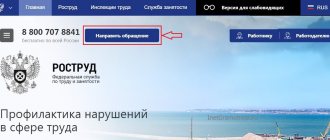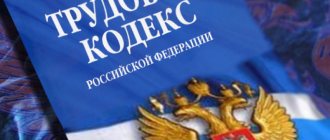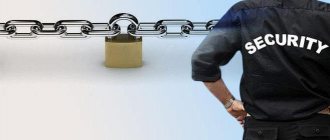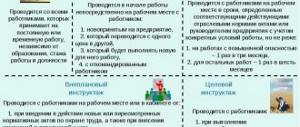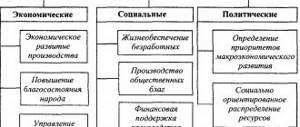Powers of the state labor inspectorate
In accordance with Art. 356 of the Labor Code of the Russian Federation, all powers of the federal labor inspectorate are reduced to the following:
- monitoring the employer's compliance with labor laws;
- presenting the employer with mandatory instructions to restore the employee’s violated labor rights;
- issuing orders to remove from work persons who are not familiar with the safety instructions and have not been able to confirm their knowledge of labor protection;
- bringing to administrative responsibility;
- investigation of the circumstances of industrial accidents;
- initiation of legal proceedings regarding violation of the law;
- suspension of the activities of the organization or its divisions.
Labor inspection - what is it and what does it check?
According to the text of this document, GTI may come in the following cases:
- When applications are received from employees of the enterprise indicating facts of violation by the employer of basic legal acts of labor legislation.
- If there is a complaint from an employee of the enterprise about a violation of his labor rights.
- When a request is received from an employee of an enterprise to check the conditions of the place where he works for compliance with labor safety requirements.
- At the end of the period assigned to the employer to eliminate violations related to the implementation of labor legislation.
This is important to know: Legal acts regulating the work activities of people with disabilities
If an employee believes that his labor rights are being violated by the employer to any extent, he has the right.
This can be done in the following cases:
According to labor laws, wages must be paid twice a month.
Rights
In order to fulfill the basic powers of the federal labor inspectorate, Art. 357 of the Labor Code of the Russian Federation secures the rights of the supervisory authority. The labor inspector can:
- freely and at any time of the day visit organizations for the purpose of conducting an inspection (if you have a certificate). If we are talking about a scheduled inspection, the inspector must notify the organization’s management no later than three working days before its start;
- request documents and information related to the employer’s compliance with the rights and legitimate interests of employees;
- remove for analysis samples of substances and materials used at the enterprise.
However, in accordance with Art. 360 of the Labor Code of the Russian Federation, a labor inspector does not have the right to conduct a scheduled inspection in the absence of an official or employees of the legal entities being inspected.
Labour Inspectorate
conducts inspections in the following cases: - upon receipt of statements from employees of the organization about facts of violation of labor legislation by the employer; - if there is a complaint from an employee of the enterprise about a violation of his labor rights. Such violations, for example, include: - delay in payment or non-payment of wages; — incorrect calculation of compensation upon dismissal; — failure to pay benefits or overtime pay; — lack of desire of the employer to enter into an employment contract; — an incorrectly drawn up employment contract, entailing a violation of the employee’s rights; — discrepancy between actual working conditions and the wording of the employment contract.
Inspector's obligations
You can contact the inspectorate in person or send a complaint by mail. During a personal meeting, the applicant can agree on the legal positions of his application. Also, the powers of state labor inspectors include providing legal advice to citizens who apply.
Regardless of the method of filing a complaint, the inspector is obliged to record the fact of the employee’s appeal to the state inspectorate and conduct an investigation into this appeal. No later than 30 days later, the labor inspector must report the results of the inspection.
There are also special deadlines according to which complaints about violations related to the dismissal of employees are considered within 10 days from the date of their receipt (Article 373 of the Labor Code of the Russian Federation).
Regulatory acts regulating the activities of the inspection
The activities of the labor inspectorate are determined and regulated by:
- Part 1 of Article No. 353 of the Labor Code (LC) of the Russian Federation,
- Regulations on the Federal Service for Labor and Employment No. 324 of June 30, 2004,
- Government Decree No. 156 of 04/06/2004,
- Model Regulations on the territorial body of the Federal Service for Labor and Employment, approved by Order No. 678n dated July 1, 2009,
- Regulations of the Federal Service for Labor and Employment, approved by Order of Rostrud No. 211 of September 11, 2007,
- Geneva Convention No. 81 of July 11, 1947, ratified in Russia by Federal Law (FZ) No. 58 of April 11, 1998,
- Federal Law No. 294 dated December 26, 2008,
- Federal Law No. 59 dated May 2, 2006.
Labor inspection is a centralized system consisting of a federal body and its regional divisions, otherwise called state inspectorates. The activities of the inspectorate at the federal level are led by the Chief State Labor Inspector of the Russian Federation. The powers of the chief federal inspector are regulated by Art. 353 Labor Code, as well as the activities of the entire inspection system.
Structure
The Federal Labor Inspectorate is a special centralized system. At the head of this system is the federal executive body. Its main task is to constantly monitor compliance with current labor legislation in our country. In this case, we can talk about both the provisions of the current Labor Code of the Russian Federation and other regulations that are regularly adopted by authorized bodies.
The main tasks of monitoring compliance with the provisions of modern labor legislation are assigned to the Federal Labor Service. In short, this authority is called Rostrud. To carry out all important tasks, Rostrud was endowed with the most diverse and numerous powers. The head of Rostrud is the chief state labor inspector in the Russian Federation. His appointment to this position, as well as subsequent removal, is carried out by official order of the Government of the Russian Federation.
It should be noted that regular monitoring of compliance with labor standards established by law is by no means the only task of Rostrud. In the course of his activities, he is assigned other, very diverse obligations. The most common and important of them include:
- Monitoring the constant increase in the level of employment of the population. For this purpose, Rostrud may develop and approve separate additional acts for interaction with organizations such as employment centers in our country.
- Taking an active part in the processes of resolving modern labor disputes. As current practice shows, conflicts between employees and their employers arise regularly for a variety of circumstances. This may include, for example, violation of the rights of employees for irregular receipt of wages, failure to comply with established rules regarding the provision of paid leave to subordinates, etc.
- Exercising constant control over labor migration in our country. Maintain proper records and statistics.
- Perform other regular tasks directly related to professional relationships.
Basics of activity
The activities of the Federal Labor Inspectorate must be entirely subject to the legislative norms existing in our country. The main one, of course, is the Constitution of the Russian Federation. In addition, in its activities the Inspectorate must take into account the current provisions of labor legislation, Decrees of the Government of the Russian Federation, international treaties, as well as other legal acts.
If we talk about the main tasks of this authority, they include:
- Ensuring adequate protection of labor rights and freedoms that are provided to citizens in our state. This may include, for example, the right to safe work, to free choice of profession, to non-discrimination by employers on personal and other grounds, etc.
- Ensuring that modern bosses comply with the current provisions of labor legislation. As current practice shows, employers regularly commit a variety of violations. They, in turn, can be expressed in certain prohibited actions of the boss or inaction on his part. Their main feature will always be a violation of the provisions of the Labor Code of the Russian Federation, as well as other regulations in modern labor legislation.
- Timely provision of up-to-date information to employers and their subordinates regarding the most effective and easiest ways to comply with modern legal provisions.
- Providing authorities with timely information regarding various labor violations that were officially recorded by the authorized body.
To carry out all the above tasks, the Inspectorate was vested with a variety of powers. Its legal rights also include the ability to establish official punishments for those responsible. In case of recording really serious violations on the part of the employer, the authorized body can prepare all the necessary materials for their subsequent sending to a judicial institution.
Authority
The most important powers that are regularly used in the activities of the Labor Inspectorate include the following:
- Carrying out constant monitoring of the legality of the activities of modern employers in our country. As you know, the work of absolutely every organization must comply with all current rules of labor legislation. In particular, during employment, the manager must conclude an official contract with the new employee, every year the director is obliged to provide the subordinate with paid leave, etc. Failure to comply with at least one rule will be a serious violation on the part of the employer. For this, liability measures provided for by law may be established against him.
- Conducting an ongoing analysis of the reasons and various important circumstances in which a serious violation of the rights of subordinates occurred. Such monitoring is required, first of all, in order to prevent similar violations in the future and to make the work of the Labor Inspectorate as efficient as possible.
- Taking an active part in the consideration of cases of civil violations that were committed by the employer. Such violations may be detected during an inspection initiated by the authorized body. For example, an employee who believes that the employer has violated his rights and interests will have a full opportunity to appeal to the Labor Inspectorate. This is done by submitting a written application to the authorized authority. After receiving such a document, the Inspectorate, in turn, will have the right to decide to schedule an unscheduled inspection of the organization’s activities.
- Collection of all necessary information for subsequent sending of documents to executive authorities. As a rule, this option is used in the event of a serious violation on the part of the employer. In such a situation, the collected materials can be sent not only to a judicial institution, but also, for example, to the prosecutor's office for further proceedings. In this case, the employer may face truly serious penalties for violations, including criminal penalties.
- Exercising constant control over the competent conduct of accident investigations by the employer. Any accident at work is an unusual situation in which the person in charge will have some important responsibilities. In particular, the head of the company will be required to properly conduct an internal investigation into the incident. For this purpose, a special commission is being created, which will clarify all the important facts and circumstances. At the end of its activities, the commission will be required to draw up an official act. It indicates the immediate causes of the accident, as well as other important information. Violation of the established regulations of the investigation procedure will be a serious crime on the part of the employer.
- Conducting an ongoing analysis of industrial injuries in our country. Developing the most effective methods to reduce current injury rates to the minimum possible. Approval of certain federal acts on the issue of increasing the level of employee safety at various enterprises in our country.
- Exercising constant control over the correctness and correctness of the implementation of the fundamental rights of employees, which are guaranteed to them by current legislative norms. This may include, for example, registration of compulsory social insurance, work in an official manner with the preliminary conclusion of an agreement and making a corresponding entry in the work book of a subordinate, etc.
- Filling out official requests to executive authorities, as well as to various other authorities, provided that the information received is required by the Inspectorate to carry out current tasks in the field of labor law.
Existing norms establish that in its activities the Labor Inspectorate should not exceed its powers. Otherwise, the penalties established by it will be considered unlawful. This, in turn, will become a full-fledged basis for their complete cancellation.
Standard methods used in the work
The main methods of activity of the labor inspectorate are scheduled and unscheduled inspections of various organizations. Scheduled supervision is inspections carried out once every 2 years. Newly formed companies are exceptions; they are not subject to inspection for the first 3 years of activity. Unscheduled audits are carried out based on applications from citizens.
Therefore, labor inspectors, as a rule, order comprehensive inspections and request all documentation that is in one way or another related to the employer’s compliance with the rights and legitimate interests of employees.
After any type of inspection, inspectors draw up a report. This document must contain:
- name of the organization being inspected,
- identified violations of labor legislation (or indication of their absence),
- measures that need to be taken to eliminate deviations from established standards,
- information about penalties for existing violations (warning, fine),
- information about the inspectors who carried out the inspection,
- start and end dates of the inspection.
Article 360. Procedure for organizing and conducting inspections of employers
The procedure for conducting inspections by officials of the federal labor inspection is determined by the conventions of the International Labor Organization on labor inspection ratified by the Russian Federation, this Code, other federal laws, as well as decisions of the Government of the Russian Federation.
State labor inspectors, in order to carry out federal state supervision over compliance with labor legislation and other regulatory legal acts containing labor law norms, conduct scheduled and unscheduled inspections throughout the Russian Federation of any employers (organizations, regardless of their organizational and legal forms and forms of ownership, and also employers - individuals) in the manner established by federal laws, taking into account the specifics established by this article.
Parts three through five are no longer in force on August 1, 2011.
The subject of the inspection is compliance with the requirements of labor legislation and other regulatory legal acts containing labor law norms, compliance with orders to eliminate violations identified during inspections and to take measures to prevent violations of labor law norms and to protect the labor rights of citizens.
The grounds for conducting an unscheduled inspection are:
expiration of the deadline for the employer to fulfill the order issued by the federal labor inspectorate to eliminate the identified violation of the requirements of labor legislation and other regulatory legal acts containing labor law norms;
admission to the federal labor inspectorate:
appeals and statements from citizens, including individual entrepreneurs, legal entities, information from government bodies (officials of the federal labor inspection and other federal executive bodies exercising state control (supervision), local governments, trade unions, from the media about facts of violations by employers of the requirements of labor legislation and other regulatory legal acts containing labor law standards, including labor protection requirements, which resulted in a threat of harm to the life and health of workers, as well as leading to non-payment or incomplete payment of wages and other wages on time payments due to employees, or the establishment of wages in an amount less than the amount provided for by labor legislation;
an employee’s appeal or statement about the employer’s violation of his labor rights;
an employee’s request to conduct an inspection of labor conditions and safety at his workplace in accordance with Article 219 of this Code;
the presence of an order (instruction) from the head (deputy head) of the federal labor inspectorate to conduct an unscheduled inspection, issued in accordance with the instructions of the President of the Russian Federation or the Government of the Russian Federation or on the basis of the request of the prosecutor to conduct an unscheduled inspection as part of the supervision of the implementation of laws received by the prosecutor's office materials and requests.
An unscheduled on-site inspection on the basis specified in paragraph four of part seven of this article may be carried out immediately with notification of the prosecutor's office in the manner prescribed by federal law, without coordination with the prosecutor's office.
Preliminary notification of the employer about an unscheduled on-site inspection on the basis specified in paragraph four or five of part seven of this article is not allowed.
The specifics of conducting inspections of compliance with the requirements of labor legislation and other regulatory legal acts containing labor law norms in organizations subordinate to federal executive authorities in the field of defense, security, internal affairs, execution of punishments and the authorized body for managing the use of atomic energy are established by the President of the Russian Federation or Government of the Russian Federation.
back to contents

